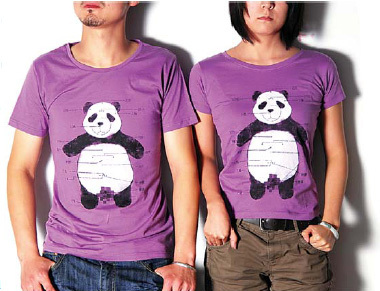 |
|
T-shirts of Beijing-based label Wazzap are popular with young fans who are splurging on clothes worn by their favorite musicians. [Guo Yingguang] |
Beijing's massive rock festivals and live concerts are full of young fans with dyed yellow hair wearing tight tank tops with Joyside, Queen Sea Big Shark or AK 47 emblazoned in hot pink, black or white across the front.
Some of them are die-hard fans of those indie bands; others couldn't name a single song by them. They've bought the top from a trendy boutique because they think it looks cool. As the summer music scene gets into full swing, this will be a familiar sight.
To many music fans, a band T-shirt is like a uniform, a statement of their affiliation. "I have nearly 100 rock band tees," says Beijing designer Ma Xin, 22. "I fell in love with rock music when I was 16 and immediately started collecting T-shirts. For me, it is like a symbol of the devotion you have sworn to your favorite groups. It is also an attitude you can express yourself."
Band T-shirts are essential fashion items now and it doesn't matter if you know the band or not. Rock music has apparently moved from the charts to the catwalks and shop racks. Fans like Ma go to music festivals, live performances and online stores to connect with their idols.
Not long ago, band T-shirts were only available in specialist music stores and were worn exclusively by committed fans and invariably came in black and big size. Now, they have been reworked into tight shaped tees and tank tops that come in all colors: pink, yellow, white, blue and so on.
Wazzap, a Beijing-based store specializing in combining music and tees, is a case in point. Chen Junwei has been the creative director of the label since 2005, when events like Beijing Pop Music Festival at Chaoyang Park, Modern Sky Music Festival and Midi Music Festival were flourishing.
He designed the festivals' official T-shirts and started working with record labels to make T-shirts for their bands. In 2006, he opened Wazzap's first store at Guloudajie, a hot meeting place for rock fans and trendsetters. It now has three branches, in Beijing's 798 art district, Sanlitun and Wudaokou, and his business has expanded to other cities, including Kunming, Yunnan province and Jinan, Shandong.
"Music defines fashion eras down the years - rock'n'roll and fashion have always gone hand in hand, especially abroad," says Chen, 31, who graduated from Beijing Institute of Clothing Technology. "Pop stars have always been fashion icons. Think of The Beatles, Madonna and The Ramones - those foreign singers go closely with fashion. Their official websites sell all sorts of products like tees, jeans and accessories."
Chen says awareness on the mainland of the link between fashion and rock music has risen in recent years.
When Nine Inch Nails came to Beijing in 2007, the 10,000 T-shirts with their name on sold out in one day.
"It just shows that musicians may have more of an influence over the way people dress than fashion designers do," Chen says.
"When a fan sees an attractive musician wearing a certain look on stage, he wants to go straight off and get exactly what the musician's wearing.
"Style has always been very important to us. The logo, color and texture reflect the band's style, which can be imitated and shared by their fans."
Prices usually range from 50 to 160 yuan ($7.3-23.4), quite cheap compared with overseas.
China's First Electronic Music Festival in May saw more than 10,000 visitors to the 798 art district. Chen's team designed the festival tee and he says many people lined up at the kiosks behind the stage to buy them.
When he began the business he sounded out musicians for ideas before anyone else. One man who appreciated that was Lao Mao, lead singer with local band AK 47, whose members wear the same tees on stage. "Music influences fashion and vice versa," he says
Fans of each style of music have their own uniform: skinny shirts and faded jeans for rockers, loose jeans and hoodies for rappers, cross-lined shirts and boots for the country singer.
In a big city like Beijing, where the music scene is booming, the music and fashion industries are starting to merge in many ways.
Record stores are now selling clothes; clothes stores are selling CDs; record companies are starting fashion lines and musicians are even designing clothes themselves. "All this activity is part of a crossover production pushing both industries forward," says Chen.
At Wazzap, the tees are designed by local designers, which is Chen's aim to prompt Chinese original clothes designers, including Cult Youth, an independent art group with 20 young artists.
Local record labels have also started designing their own clothes in recent years, and more are planning to follow suit. Pilot Music, an indie record label, has designed 10 series of T-shirts for artists, such as AK 47 and Reflector.
Zhong Sheng, a manager at Pilot Music, believes the fashion and music worlds may intersect more in the future as increasing numbers of people love local original music.
(China Daily July 10, 2009)